Review: Z: A Novel of Zelda Fitzgerald by Theresa Anne Fowler
“If I could fit myself into this mail slot, here, I’d follow my letter all the way to Hollywood, all the way to Scott, right up to the door of our next future.” Thus begins the roller coaster ride that was Zelda Fitzgerald’s life. Z: A Novel of Zelda Fitzgerald was a fascinating read, packed full of surprising information about this iconic couple. Theresa Anne Fowler has recreated the glamour of the 1920s with her vivid descriptions and dialogue. The one overwhelming fact, which is painfully exhibited time and time again, was that Zelda’s life with F. Scott Fitzgerald was heartbreaking. Yet, this descriptor still does not adequately convey the anguish that was her life. Z: A Novel of Zelda Fitzgerald provides the reader with a mesmerizing romp through the life this couple shared; a life that could easily be titled The Good, the Bad, and the Ugly, at the end more bad and ugly.
The enjoyment of this novel will be enhanced if the reader allows the craziness of the time period to wash over them, and not judge with a twenty-first century mindset. Remember, the Jazz Age was a time of wanton, outrageous behaviors and wasteful spending by the elite of the "Roaring Twenties. The Fitzgerald’s ran with this exclusive crowd for a good part of their married life. For some readers, this might be a wrinkle in their enjoyment of the novel. Don't stop, keep reading, the more you become a “voyeur” of the era, the more you will enjoy the story. This reader liked it more and more the further into the story I read. You will hear the rhythm of the story, and when that happens sit back and enjoy.
Be forewarned, Theresa Fowler’s depiction of the couple will change how you look at F. Scott Fitzgerald as a writer and a human being. Theresa Fowler’s Zelda comes across as being mistreated by her husband. In today’s society much of the behavior that is displayed by Fitzgerald would be considered abusive. Even more shocking was his willingness to take credit for short stories written by his wife because, as he put it, he provided the opportunities and experiences that she chose as subject matter. In other words, he financed their over-the-top lifestyle, and without that, Zelda would have had nothing of interest to write. Zelda allows this and other questionable decisions and actions by her husband, which encapsulates the codependency of Zelda and Scott. “All the worriers around me fear I’m too fragile to endure Scott’s funeral, and I’ve chosen not to fight the current this time. There’s no need for me to be present; I’m not saying good-bye.” These were Zelda’s closing thoughts, which end the novel, again attesting to the co-dependent relationship in which this iconic couple thrived even in F. Scott Fitzgerald's death.
If you are a fan of Fitzgerald or Hemingway the novel, although a work of fiction, does provide an honest portrayal of each. I have to say again, F. Scott Fitzgerald comes off looking like an abusive husband with extremely low self-esteem, and an alcoholic. Ernest Hemingway, the family’s literary “frenemy,” comes off looking like a sycophant who used "friends" until he didn't need them anymore. In other words, if Hemingway’s career could not be furthered along with their help, he dumped them, often in a very mean spirited manner. If you like either one of these authors this aspect of the novel might turn you off from reading either Fitzgerald or Hemingway’s novels. Personally, I sometimes have trouble reading an author’s work if I know that they were not a very nice human being. Neither of these literary giants comes off unscathed.
Once into the grove of life in the 20s, Z: A Novel of Zelda Fitzgerald by Theresa Fowler was hard to put down. The imaginative manner Ms. Fowler shared Zelda's life made you feel like you knew her, and in knowing her, felt her pain and sorrow. The Afterward of the novel provided a satisfying close to Z: A Novel of Zelda Fitzgerald. If you are a fan of this growing genre of historical fiction based on literary spouses this is a must read.
I would like to thank St. Martin’s Press and Net Galley for providing an Advance Readers Copy of Z: A Novel of Zelda Fitzgerald by Theresa Fowler
Rating:
| 4 of 5 stars
Zelda Fitzgerald
|
|---|
Summary Courtesy of Goodreads
I wish I could tell everyone who thinks we’re ruined, Look closer…and you’ll see something extraordinary, mystifying, something real and true. We have never been what we seemed.
When beautiful, reckless Southern belle Zelda Sayre meets F. Scott Fitzgerald at a country club dance in 1918, she is seventeen years old and he is a young army lieutenant stationed in Alabama. Before long, the “ungettable” Zelda has fallen for him despite his unsuitability: Scott isn’t wealthy or prominent or even a Southerner, and keeps insisting, absurdly, that his writing will bring him both fortune and fame. Her father is deeply unimpressed. But after Scott sells his first novel, This Side of Paradise, to Scribner’s, Zelda optimistically boards a train north, to marry him in the vestry of St. Patrick’s Cathedral and take the rest as it comes.
What comes, here at the dawn of the Jazz Age, is unimagined attention and success and celebrity that will make Scott and Zelda legends in their own time. Everyone wants to meet the dashing young author of the scandalous novel—and his witty, perhaps even more scandalous wife. Zelda bobs her hair, adopts daring new fashions, and revels in this wild new world. Each place they go becomes a playground: New York City, Long Island, Hollywood, Paris, and the French Riviera—where they join the endless party of the glamorous, sometimes doomed Lost Generation that includes Ernest Hemingway, Sara and Gerald Murphy, and Gertrude Stein.
Everything seems new and possible. Troubles, at first, seem to fade like morning mist. But not even Jay Gatsby’s parties go on forever. Who is Zelda, other than the wife of a famous—sometimes infamous—husband? How can she forge her own identity while fighting her demons and Scott’s, too? With brilliant insight and imagination, Therese Anne Fowler brings us Zelda’s irresistible story as she herself might have told it.
Additional Resources:
NPR Interview with Theresa Anne Fowler: Click HERE
New York Times Article: Hemingway's Letters Tell of Fitzgerald
New York Times Article: With Hemingway as Friend, Who Needed Enemies?
Flavorwire's Article: Read Hemingway's Tough-Love Critique of F. Scott Fitzgerald's 'Tender Is the Night'
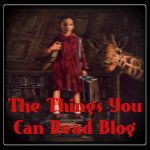
NPR Interview with Theresa Anne Fowler: Click HERE
New York Times Article: Hemingway's Letters Tell of Fitzgerald
New York Times Article: With Hemingway as Friend, Who Needed Enemies?
Flavorwire's Article: Read Hemingway's Tough-Love Critique of F. Scott Fitzgerald's 'Tender Is the Night'
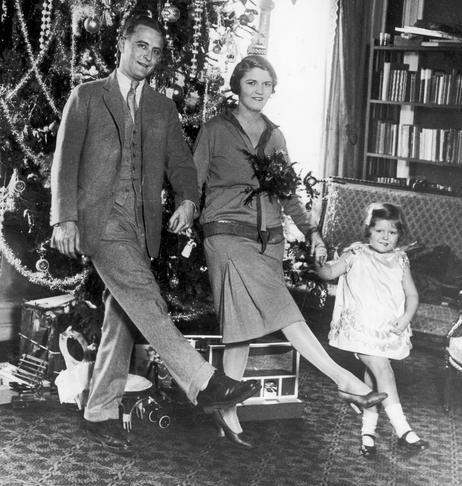 |
| F. Scott Fitzgerald dances with his wife, Zelda, and daughter, Frances "Scottie," in front of a Christmas tree in Paris. |

Hemingway and Fitzgerald in Paris, France in 1925
Quote
 “His [Scott Fitzgerald's] talent was as natural as the pattern that made by the dust on a butterfly's wings. At one time he understood it no more than the butterfly did and he did not know when it was brushed or marred. Later he became conscious of his damaged wings and of their construction and he learned to think and could not fly any more because the love of flight was gone and he could only remember when it had been effortless.”― Ernest Hemingway, A Moveable Feast
“His [Scott Fitzgerald's] talent was as natural as the pattern that made by the dust on a butterfly's wings. At one time he understood it no more than the butterfly did and he did not know when it was brushed or marred. Later he became conscious of his damaged wings and of their construction and he learned to think and could not fly any more because the love of flight was gone and he could only remember when it had been effortless.”― Ernest Hemingway, A Moveable Feast
Zelda Fitzgerald
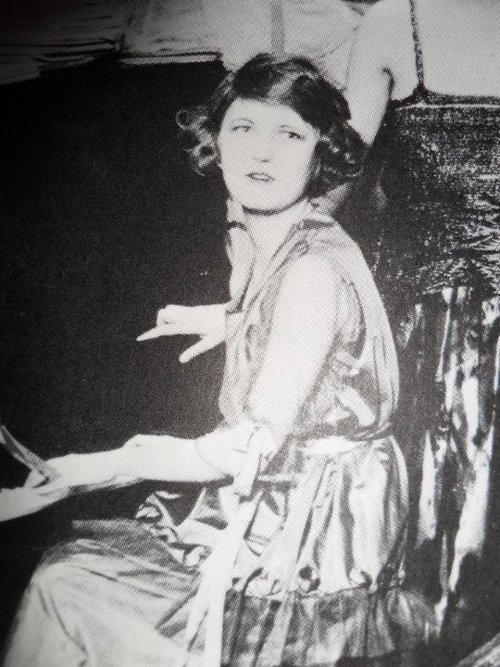 Image Credit: fyeahzeldafitzgerald
Image Credit: fyeahzeldafitzgerald
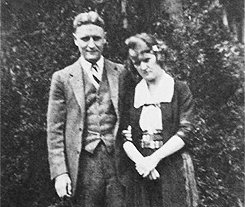
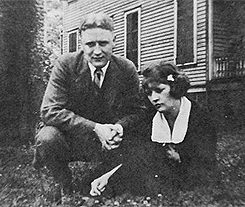 Zelda and F. Scott Fitzgerald
Happy Reading!
Zelda and F. Scott Fitzgerald
Happy Reading!
The Things You Can Read
Believe In Truth, Beauty, Freedom, Love, and the Power of Books
 |
| Hemingway and Fitzgerald in Paris, France in 1925 |
Quote
 “His [Scott Fitzgerald's] talent was as natural as the pattern that made by the dust on a butterfly's wings. At one time he understood it no more than the butterfly did and he did not know when it was brushed or marred. Later he became conscious of his damaged wings and of their construction and he learned to think and could not fly any more because the love of flight was gone and he could only remember when it had been effortless.”― Ernest Hemingway, A Moveable Feast
“His [Scott Fitzgerald's] talent was as natural as the pattern that made by the dust on a butterfly's wings. At one time he understood it no more than the butterfly did and he did not know when it was brushed or marred. Later he became conscious of his damaged wings and of their construction and he learned to think and could not fly any more because the love of flight was gone and he could only remember when it had been effortless.”― Ernest Hemingway, A Moveable Feast
Zelda Fitzgerald

Image Credit: fyeahzeldafitzgerald


Zelda and F. Scott Fitzgerald
Happy Reading!
The Things You Can Read
The Things You Can Read


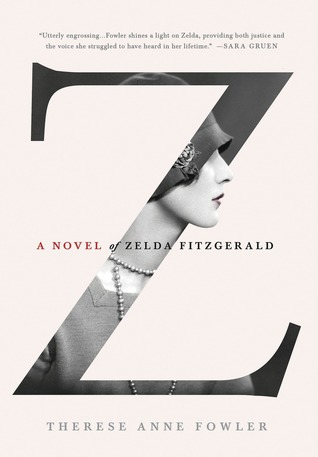
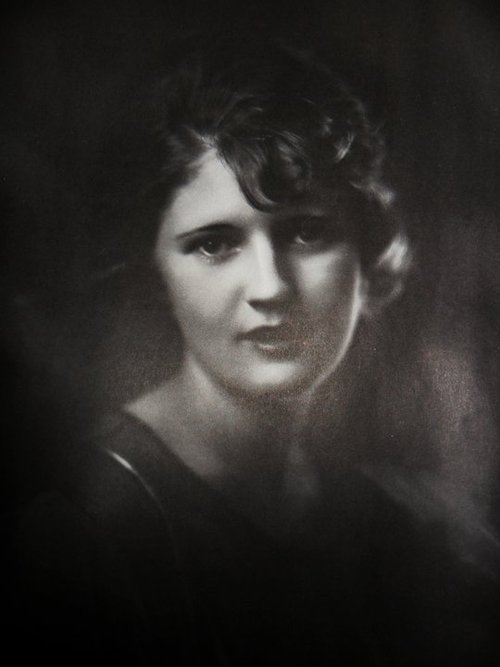
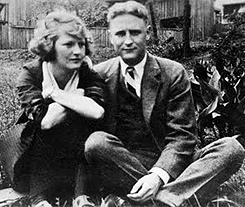

Very curious indeed. I'll look for this one. I'm usually turned off if I fill like there isn't more to excess. The descriptions of it usually bore me. However, if the excess is simply part of a bigger picture, it is more likely that I'll enjoy.
ReplyDeleteI think you might enjoy this because Zelda realizes the excess is destroying her and her marriage.
DeleteCynthia @ The Things You Can Read